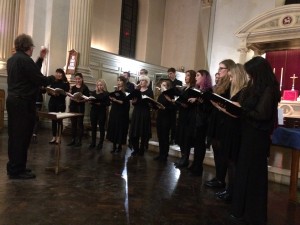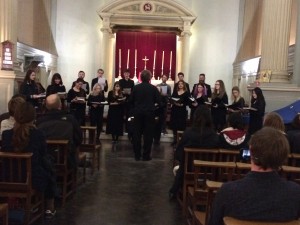This autumn, the Middle East and Central Asia Music Forum was held in a new, and fitting, location – the music department at SOAS. On Monday 7th November, we were treated to a full day of papers covering a fascinating range of topics, as well as some fantastic live performances. Thematically, the research presented tackled a wide range of ethnomusicological issues. Several papers dealt with the intersection of music and various contemporary political issues affecting the region, whereas others focussed directly on musical content itself, including improvisation, modes and recording techniques. Others still looked to the past; we were treated to some fascinating historical insights, and even listened to a band take itself back in time!
Geographically, we began in Morocco, the most westerly country featured at the conference. The first speaker, Cristina Morena Almeida (King’s College, London), woke us up with her opening presentation, entitled ‘“Sell Everything except yourself”: understanding the backlash against rappers’ involvement in organised political campaigns’. Cristina’s thought-provoking work was followed by Ilana Webster-Kogen’s (SOAS) fascinating account of the music of Eritrean and Ethiopian migrants across the Middle East, which provided a great insight into her ethnographic work in Israel and the Arabian Gulf.
After the break, co-convenor Laudan Nooshin (City) posed much food for thought with her paper entitled ‘Whose liberation? Iranian popular music and the fetishisation of resistance’. After a lively and fruitful discussion, we were treated to a roundtable with the Oxford Maqam ensemble, featuring Martin Stokes, Yara Abou-El-Fadi and Tarik Bashir. The ensemble has recently undertaken a fascinating wax cylinder recording project; it was hard to tell the difference between recordings dating from the 1900s and their recent output! After discussing the technical and contextual aspects of their work, they played one of their recorded songs live for us; a surreal comparison.
Unfortunately, Julian Harris (King’s College, London) was unwell and unable to attend. Julian’s paper was entitled “Ta’abiriya: ‘expressionism’ in Arab music: composition in the Iraqi school of ‘oud”, and happily for the audience, Professor Owen Wright (SOAS) kindly offered an impromptu talk on the topic. Continuing with the ‘oud theme, Baha Yetkin then presented his work, entitled “Ottoman-Turkish improvisation on the Turkish-style ‘oud”. Baha deftly demonstrated the music he analysed in his paper on his ‘oud, which was highly educational for those not as well versed in Turkish music theory.
After an afternoon break for tea and coffee, John O’Connell (Cardiff University) discussed issues pertaining to Turkish nationalism in the early 20th Century, and enlightened us about the mystical, imagined land of ‘Turan’. To round off the papers, Erum Naqvi’s (Pratt Institute, New York) examination of Iranian classical concerts in the past and present both complemented and contrasted with Laudan’s earlier presentation.
After a fascinating day filled with information and discussions, many of us went straight down to the SOAS union to grab a well-deserved drink, before returning for a performance by Maya Youssef’s Middle East Ensemble, based at SOAS. For the best part of an hour, her deft qanun playing mesmerised and moved us. She was accompanied by darbuka, violin and vocals, playing a mixture of her own original compositions and classics from across the Arab world, including the music of Lebanese singer Fairuz and Syrian-Egyptian ‘oud player and composer Farid al-Atrash.
Thank you to all our speakers, performers and audience members for attending and contributing; additional thanks to Rachel Harris for organising and chairing.
Gabrielle Messeder, PhD Music Student




